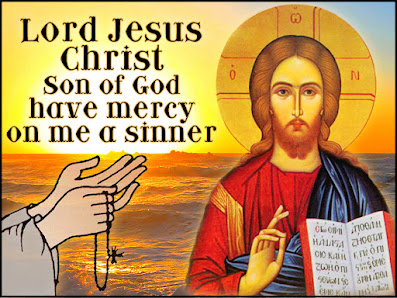The Jesus Prayer
"Pray without ceasing." How, exactly, are we to do that? I can't just sit and pray all day. I have responsibilities: A job, a family, etc. And what would I pray about? I'm not good with words, and even if I was, surely I would run out of thoughts to pray about.
The answer to every question about this is the Jesus Prayer.
Let's look at the prayer itself, in smaller parts:
"Lord Jesus Christ." The Name above all names at which every knee shall bow and every tongue confess. The titles Lord and Christ, the anointed one of God. As the song says, there 's power in the Name. When we call upon the Name of the Lord, we worship Him(Ps 116), we draw near to Him, and He draws near to us (Ja 4:8). How long have I lived my life attending services on Sunday but leaving and spending the rest of the week drifting away? But if I call on His Name throughout the day, I call to mind His imminent presence and I maintain closeness with Him. I repent, literally turning toward Him.
"Lord Jesus Christ." The Name above all names at which every knee shall bow and every tongue confess. The titles Lord and Christ, the anointed one of God. As the song says, there 's power in the Name. When we call upon the Name of the Lord, we worship Him(Ps 116), we draw near to Him, and He draws near to us (Ja 4:8). How long have I lived my life attending services on Sunday but leaving and spending the rest of the week drifting away? But if I call on His Name throughout the day, I call to mind His imminent presence and I maintain closeness with Him. I repent, literally turning toward Him.
"Son of God." Who He is. As we sing in the Liturgy, the "only begotten Son and Word of the Father, Who for our salvation willed to be incarnate of the holy Mother of God and ever virgin Mary." Who for our sake became man. The Eternal Logos Who was with God and is God since before the creation. He Who made all things that were made. He Who opened to us the way to everlasting life. When we say this clause, we are making an honest assessment of who Jesus is. We'll make another assessment in a minute.
"Have mercy on me." What He does. This is the prayer of all saints and all Christians. It is the cry that opens the ultimate prayer of repentance, Psalm 50. It is the call of the blind man over the crowd "Son of David! Have mercy on me!" and when they tried to hush him up, he cried out all the louder! When we pray for God's mercy, we confess that we are out of order, sick, dysfunctional, and that we need His mercy to heal us. It is said that the Greek "eleison," have mercy, is related to the Greek "eleon," olive or olive oil (I don't remember at the moment). The "word play" calls to mind anointing with oil and sees Jesus' mercy on us as enveloping like anointing with oil.
"A sinner." This is just a frank assessment of our condition. We fall short of the Glory of God at every moment, and that is what sin is: to miss the mark. There are acts of sin, and there is the condition of sin, and we obviously find ourselves in this condition. Sinner is not something we wallow in. It's not a title we grasp with any sort of pride or hubris with a sneer. It's not a resignation or a goal. It's just a confession. God says of the Prophet-King David, a saint, that he is a man after God's own heart, whom God loved and whom He took from Jesse and following sheep to shepherd His people Israel. Yet, this "man after God's own heart" admits "I know my iniquity, and my sin is ever before me." When he lost sight of his condition, bad things happened, like adultery and murder. When Nathan showed David his sin and brought him back to his senses, he repented and authored that most excellent of repentant prayers.
Practically speaking...
So what about our questions above? How does this look in practice? It is a short and simple prayer, so it can be said when doing things that don't require absolute focus and concentration. Driving? Say the prayer. Brain surgery? Pray before and after. :-) Be sure to add five minutes of sitting still and saying the Jesus prayer, focused on the words, to the end of your prayer rule. Say it when you're sick. Say it as you drift to sleep. Say it as often as you can. Be like that widow at the door of the judge, constantly seeking mercy. This is no "vain repetition" because you don't stand on street corners saying it out loud so others can see you. You say it silently, in your heart.
Orthodoxy involves the body mind and heart in prayer, so get a prayer rope and use it when you say the prayer. Hold one knot and say the prayer, move to the next knot and say it again. When you get all the way around to the cross, say the Lord's prayer, then "Rejoice O Virgin Theotokos, O Mary, full of grace...", and start again.
What about other people? Modify it to "Lord Jesus Christ, Son of God, have mercy on Scott" and go through your prayer list. Pray for family and friends, and you can add "for healing" or "bless their family" or whatever specific concern, or none. He knows! As you enter the Life of Christ through prayer, and use the Jesus prayer more and more, it will become natural. You may have prayed for everyone you know and all the concerns you have or know about, so just go back to "Lord Jesus Christ, Son of God, have mercy on me, a sinner" and after a while, something will come to mind. Since you're already praying, just add it in to your cycle, and then move on. There's no need to search for lofty words. As a matter of fact, when you've used up all your words but you're still very concerned, just repeat "...have mercy on [name(s)]" of the people. It's an extraordinary act of love to lift them up by name before the throne of God.
One Caveat
We pray because God invites us into this communion with Himself. We are not reciting a mantra while clutching a talisman. It's not magic. We do not seek or try to conjure visions, etc. When we say the Jesus prayer, we focus on the words and the others for whom we pray. Do not allow yourself to fall into any traps about visions or personal holiness, etc. That is a quick way to delusion and falling. Pray the words. If your eyes are closed, and your mind wanders with images, open your eyes and look at your icons. Discipline your intellect.
God bless you, and draw near to you as you draw near to Him.



Comments